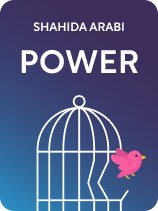

This article is an excerpt from the Shortform book guide to "Power" by Shahida Arabi. Shortform has the world's best summaries and analyses of books you should be reading.
Like this article? Sign up for a free trial here.
Is your partner constantly tearing you down? Do they ever build you back up with compliments and gifts?
The above pattern is quite common in narcissists. According to Power by Shahida Arabi, it’s a tactic known as “Idealize-Devalue-Discard,” which manipulates victims into staying in the relationship.
Let’s take a closer look at the Idealize-Devalue-Discard tactic.
A Pattern of Building You Up and Tearing You Down
A common behavior in narcissists is a repeating pattern of showering you with love, compliments, and affection to suck you into a relationship, only to then tear you down psychologically through covert and direct insults. Arabi says that this tends to end with the narcissist abandoning you in a cruel way, though they are likely to try to maintain control and start the pattern all over again with false promises of changing their behavior. Arabi refers to this as the “Idealize-Devalue-Discard” cycle.
(Shortform note: In Why Does He Do That?, Bancroft says that playing “hot and cold” is a common strategy used by abusers in general—not just narcissists—to maintain control and keep the victim walking on eggshells because they’re not sure which version of their partner they’ll get from moment to moment. He writes that in this pattern of behavior, the phases of false kindness feel like a relief compared to the abuser’s hostile phases, even though it’s manipulation.)
This tactic is effective because at the neurological level, it establishes a biochemical addiction to the narcissist. The narcissist’s false charm and over-the-top expressions of love (what Arabi calls “love-bombing”) tend to make you invested in them quickly, and it leads to high amounts of the brain chemical dopamine that makes you feel good. (Shortform note: Experts assert that signs of love-bombing to look out for at the onset of a relationship include: excessive gifts, strong jealous reactions when you spend time with other people, constant praise and flattery, and pressure to make your relationship serious very quickly.)
Arabi then says that when the narcissist begins to turn on you and withhold that affection, you’ll strive to please them to get back to that level of dopamine. By erratically flip-flopping between love and cruelty, the narcissist creates what psychologists call an “intermittent reward” that makes the dopamine rush even more intense when they finally treat you well. Arabi compares this to when people play slot machines, and they can’t stop playing because of the randomness of the occasional earnings.
(Shortform note: Social media companies also leverage the phenomenon of intermittent rewards to keep people engaged longer, spurring widespread addiction to apps such as Facebook and Instagram. For example, one article says that Instagram’s algorithm is programmed to withhold “likes” on posts and then deliver them in larger bursts. This results in the user’s initial disappointment that they didn’t receive social validation, followed by compulsive checking of their notifications, and finally the dopamine rush of several “like” notifications that encourages the user to keep posting.)
Attacking Your Self-Esteem
Arabi writes that during the stages of hurting you psychologically, the narcissist may use outright insults, like “You’re so bad at your job” or more covert tactics that they try to hide their malice behind. For example, they might express fake concern by saying, “I’m worried that you don’t make enough money to meet your needs,” knowing full well that you do. Arabi says that this type of insincere statement is intended to make you feel worthless and inadequate (which makes narcissists feel better about themselves). Arabi adds that because of their pathological envy, narcissists will especially target areas in which you’re successful and confident.
(Shortform note: Some people without NPD may use covert insults in the form of passive aggression when they’re unable to express their negative feelings or want to exert control over someone else. In addition, feeling jealousy or envy can be a normal and healthy emotion. However, the distinction between milder forms of these behaviors and abusive behaviors is when it threatens someone else’s psychological safety or when it becomes pathological, meaning it’s obsessive or influenced by an underlying mental health condition.)
Narcissists may also damage your self-esteem by speaking poorly of you to others, often projecting their own faults onto you. For example, they might tell everyone in your friend group that you’re controlling and rude to them. This constant trash-talking (what Arabi calls the “smear campaign”) is intended to damage your reputation to the point of causing social isolation, so you’re even more dependent on them. Arabi says that this also reduces your ability to confide in others about the abuse, thereby making it less likely that you’ll be able to hold the abuser accountable.
Lastly, Arabi says narcissists often strategically talk about other people in a way that makes you feel bad about yourself by comparison. Arabi calls this “triangulation” because the narcissist brings a third person into the relationship dynamic, even though that person may not even be aware this is happening, and the information is often false. For example, the narcissist might bring up their ex-partner frequently, talking about how talented they are or other positive traits. Similar to the covert insult examples, the narcissist might target either the areas you like about yourself (to erode your confidence) or the areas you’re particularly insecure about (to inflict a deeper psychological wound).
(Shortform note: Speaking poorly about you to other people or making hurtful comparisons are also behaviors that can occur in toxic friendships. Experts suggest that if you notice these happening regularly with a friend, and the friendship makes you feel less confident and more stressed, it’s best to start an honest conversation about how they make you feel. If there’s no improvement after the initial discussion or if there’s no real benefit to the relationship, end the friendship. Experts also point out that friendships can be abusive too, even though they’re less intimate than a relationship with a romantic partner.)

———End of Preview———
Like what you just read? Read the rest of the world's best book summary and analysis of Shahida Arabi's "Power" at Shortform.
Here's what you'll find in our full Power summary:
- A look at the severe condition called Narcissistic Personality Disorder (NPD)
- How to avoid or end relationships with narcissists
- Advice for healing after narcissistic abuse






